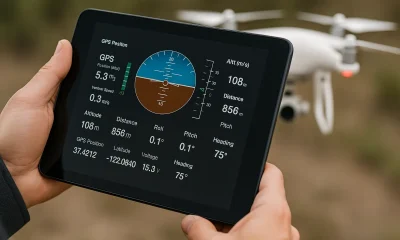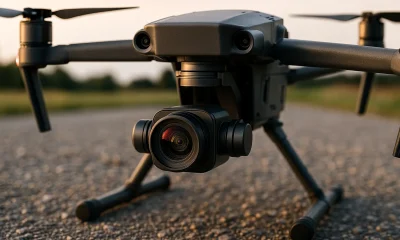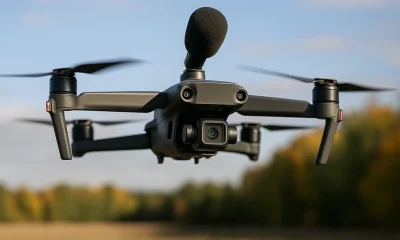- Acronym Guide
- AAM
- ABS
- AC
- ACAS
- ADS-B
- AEHF
- AFAC
- AGL
- AI
- AIM
- ALPA
- ALS
- AM
- AMA
- ANSP
- AOI
- APPI
- AUV
- AUVSI
- ARPAS-UK
- ASTM
- ATC
- BVLOS
- CAA
- CAAC
- CAB
- CAP
- CASA
- CATT
- CBO
- CBR
- CBRN
- CDMA
- CDR
- CFI
- CFR
- CIR
- COA
- COMINT
- CORS
- COTP
- COTR
- CPTED
- CV
- C2
- DAA
- DAS
- DEM
- DFI
- DFS
- DGCA
- DHS
- DOD
- DPA
- DPEs
- DRG
- DRO
- DSM
- DSMX
- DSP
- DSSS
- DTM
- EASA
- EFT
- EO
- EOD
- EO/IR
- ELINT
- EMI
- ESC
- EVLOS
- eVTOLs
- FAA
- FCC
- FCS
- FHSS
- FICCI
- FLIR
- FOB
- FOV
- FPS
- FPV
- GBDAA
- GCP
- GCS
- GDPR
- GML
- GNSS
- GPS
- GSD
- GVC
- HDR
- HOGE
- IACRA
- ICAO
- ICS
- IMU
- INS
- IR
- ISA
- ISR
- ITU
- JARUS
- LAAMS
- LAANC
- LAATM
- LAI
- LAS
- LBA
- LIDAR
- LOS
- LSALT
- MAC
- MAVLink
- MLIT
- MMS
- MSL
- MTOM
- NDAA
- NCSL
- NFZ
- NIST
- NMEA
- NOTAM
- NPA
- NPRM
- NTIA
- OBIA
- OEM
- OFDM
- OGI
- OOP
- PAS
- PASM
- PAV
- PCV
- PdM
- PEC
- PIC
- PID
- PIPL
- PLD
- PM
- PN
- PPK
- PPS
- PSM
- PTZ
- PWM
- UAM
- UAOP
- UAS
- UASTM
- UAV
- UCAVs
- UHD
- UHF
- USV
- UTM
- RAIM
- RCC
- RCS
- RFI
- ReOC
- RePL
- RMS
- ROI
- RPAS
- RPC
- RTH
- RTN
- RTK
- SaR
- SAR
- SARP
- SBAS
- S.Bus
- SBIR
- SEDENA
- SfM
- SFOC
- SIGINT
- SLAM
- SMS
- SOP
- SORA
- STANAG
- STTR
- STK
- sUAS
- TCAS
- TCCA
- TFR
- TIN
- TLM
- TOF
- TP
- TPS
- TSA
- VHF
- VLOS
- VTOL
Drone Acronyms
What is GDPR (General Data Protection Regulation) ?
By
Jacob StonerTable Of Contents

Definition
GDPR stands for General Data Protection Regulation. It is a comprehensive data protection law implemented by the European Union (EU) that governs the processing of personal data of individuals within the EU. GDPR aims to protect individuals’ privacy and give them greater control over their personal information, while also standardizing data protection laws across the EU.
Usage
GDPR applies to any organization, whether inside or outside the EU, that processes the personal data of individuals located within the EU. This includes companies that collect, store, or use data for various purposes, such as marketing, analytics, and service delivery. Drone operators and companies that use drones to collect or process personal data, such as capturing images or videos in public spaces, must ensure compliance with GDPR requirements.
Relevance to the Industry
For the drone industry, GDPR is particularly relevant when drones are used in ways that involve the collection or processing of personal data. This includes aerial photography, surveillance, and mapping activities that might capture identifiable individuals. Compliance with GDPR is crucial to avoid substantial fines and to ensure that privacy rights are respected.
How Does GDPR (General Data Protection Regulation) Work?
Scope and Applicability:
- Global Reach:
- Territorial Scope: GDPR applies to any organization that processes the personal data of individuals within the European Union (EU), regardless of where the organization is located. This means that even non-EU companies, including drone operators and service providers, must comply with GDPR if they collect or process data related to EU citizens.
- Personal Data: GDPR covers any information that can directly or indirectly identify an individual, such as names, addresses, photos, videos, and IP addresses. For drone operators, this includes any images or footage captured by drones that can be linked to identifiable persons.
- Key Requirements:
- Lawful Processing: Organizations must have a legal basis for processing personal data, such as obtaining consent from the individual, fulfilling a contract, complying with a legal obligation, or pursuing legitimate interests. For drone operations, consent is often required when capturing identifiable images or data.
- Data Protection Impact Assessments (DPIAs): When drone operations are likely to result in high risks to individuals’ privacy, such as extensive surveillance or monitoring, operators must conduct a DPIA. This assessment identifies potential risks and outlines measures to mitigate them, ensuring that data processing is compliant with GDPR.
Compliance and Implementation:
- Consent Management:
- Obtaining Consent: Drone operators must obtain explicit and informed consent from individuals before collecting their personal data. Consent must be specific, unambiguous, and given freely, with the option for individuals to withdraw their consent at any time. For example, before conducting aerial filming in public spaces, operators should inform people about the data being collected and obtain their permission.
- Record Keeping: Organizations are required to maintain records of consent and be able to demonstrate that consent was obtained in accordance with GDPR standards.
- Data Subject Rights:
- Access and Rectification: Individuals have the right to access their personal data held by an organization and request corrections if the data is inaccurate. Drone operators must have processes in place to respond to such requests in a timely manner.
- Right to Erasure: Also known as the “right to be forgotten,” individuals can request the deletion of their personal data when it is no longer necessary for the purposes for which it was collected. Drone operators must comply with such requests unless there are legal grounds to retain the data.
- Data Portability: Individuals have the right to receive their personal data in a commonly used format and transfer it to another organization if desired.
Security and Breach Management:
- Data Security:
- Technical and Organizational Measures: Drone operators must implement appropriate technical and organizational measures to protect personal data from unauthorized access, loss, or destruction. This includes encrypting data, securing storage systems, and ensuring that only authorized personnel have access to the data.
- Data Minimization: Operators should collect only the data necessary for the specific purpose of the drone operation, thereby minimizing the amount of personal data processed and reducing the risk of breaches.
- Breach Notification:
- Reporting Requirements: In the event of a data breach that poses a risk to individuals’ rights and freedoms, the organization must report the breach to the relevant supervisory authority within 72 hours of becoming aware of it. If the breach is likely to result in a high risk to the individuals affected, the organization must also inform those individuals without undue delay.
- Incident Response: Organizations should have a data breach response plan in place to quickly address and mitigate the impact of any breaches. This plan should include steps for containment, assessment, notification, and remediation.
Enforcement and Penalties:
- Supervisory Authorities:
- Regulatory Oversight: Each EU member state has a designated supervisory authority responsible for enforcing GDPR and ensuring compliance. These authorities have the power to investigate complaints, conduct audits, and impose fines on organizations that violate GDPR.
- Cooperation Mechanisms: Supervisory authorities across the EU cooperate to ensure consistent enforcement of GDPR, particularly in cross-border cases where data processing involves multiple jurisdictions.
- Penalties for Non-Compliance:
- Fines: GDPR allows for substantial fines for non-compliance, with penalties reaching up to €20 million or 4% of the organization’s global annual turnover, whichever is higher. The severity of the fine depends on factors such as the nature of the violation, the level of cooperation with the supervisory authority, and the measures taken to mitigate the breach.
- Reputational Impact: Beyond financial penalties, non-compliance with GDPR can result in significant reputational damage, leading to loss of customer trust and potential business setbacks.
By following these processes and implementing the necessary safeguards, organizations, including drone operators, can ensure that their data processing activities comply with GDPR, thereby protecting individuals’ privacy rights and avoiding the severe penalties associated with non-compliance.
Example in Use
“The drone company implemented GDPR-compliant procedures to ensure that all data collected during aerial surveys was processed in line with EU data protection regulations.”
Frequently Asked Questions about GDPR (General Data Protection Regulation)
1. What are the key principles of GDPR?
Answer: The key principles of GDPR include:
- Lawfulness, Fairness, and Transparency: Personal data must be processed legally, fairly, and in a transparent manner.
- Purpose Limitation: Data should only be collected for specific, explicit, and legitimate purposes, and not used for other purposes.
- Data Minimization: The collection of data should be limited to what is necessary for the intended purpose.
- Accuracy: Personal data must be kept accurate and up to date.
- Storage Limitation: Data should not be kept for longer than necessary for the purposes for which it was collected.
- Integrity and Confidentiality: Data must be processed in a way that ensures appropriate security, including protection against unauthorized or unlawful processing and against accidental loss, destruction, or damage.
2. How does GDPR affect drone operations?
Answer: GDPR affects drone operations by:
- Requiring Consent: Drone operators must obtain explicit consent from individuals before capturing or processing their personal data, such as images or videos.
- Implementing Data Protection Measures: Organizations using drones must ensure that any data collected is securely stored and processed in compliance with GDPR requirements.
- Conducting Data Impact Assessments: For operations that are likely to result in high risks to individuals’ privacy, such as large-scale surveillance, operators may need to conduct Data Protection Impact Assessments (DPIAs) to identify and mitigate risks.
- Ensuring Data Subject Rights: Individuals have the right to access, rectify, and erase their data, and drone operators must have processes in place to honor these rights.
3. What are the penalties for non-compliance with GDPR?
Answer: Penalties for non-compliance with GDPR can include:
- Fines: Organizations can face fines of up to €20 million or 4% of their annual global turnover, whichever is higher, for the most serious violations.
- Reputational Damage: Non-compliance can lead to significant reputational harm, affecting customer trust and business relationships.
- Legal Action: Individuals affected by non-compliance have the right to seek compensation through legal action, leading to further financial and operational impacts on the organization.
For examples of these acronyms visit our Industries page.
As the CEO of Flyeye.io, Jacob Stoner spearheads the company's operations with his extensive expertise in the drone industry. He is a licensed commercial drone operator in Canada, where he frequently conducts drone inspections. Jacob is a highly respected figure within his local drone community, where he indulges his passion for videography during his leisure time. Above all, Jacob's keen interest lies in the potential societal impact of drone technology advancements.
Pros
Cons
You may like


What is ALPA (Air Line Pilots Association) & How Does it Work?


What is AEHF (Advanced Extremely High Frequency)?


What is TLM (Telemetry) & How Does it Work?


What is PTZ (Pan-Tilt-Zoom) & How Does it Work?


What is PAS (Passive Acoustic Sensor) & How Does it Work?


What is OGI (Optical Gas Imaging) & How Does it Work?